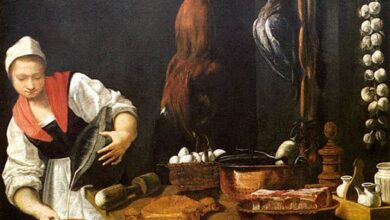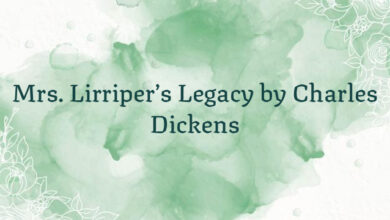
The Renaissance at Charleroi by O. Henry
Grandemont Charles was a little Creole gentleman, aged thirty-four, with a bald spot on the top of his head and the manners of a prince. By day he was a clerk in a cotton broker’s office in one of those cold, rancid mountains of oozy brick, down near the levee in New Orleans. By night, in his three-story-high /chambre garnier/ in the old French Quarter he was again the last male descendant of the Charles family, that noble house that had lorded it in France, and had pushed its way smiling, rapiered, and courtly into Louisiana’s early and brilliant days. Of late years the Charleses had subsided into the more republican but scarcely less royally carried magnificence and ease of plantation life along the Mississippi. Perhaps Grandemont was even Marquis de Brasse. There was that title in the family. But a Marquis on seventy-five dollars per month! /Vraiment/! Still, it has been done on less.
Grandemont had saved out of his salary the sum of six hundred dollars. Enough, you would say, for any man to marry on. So, after a silence of two years on that subject, he reopened that most hazardous question to Mlle. Adele Fauquier, riding down to Meade d’Or, her father’s plantation. Her answer was the same that it had been any time during the last ten years: “First find my brother, Monsieur Charles.”
This time he had stood before her, perhaps discouraged by a love so long and hopeless, being dependent upon a contingency so unreasonable, and demanded to be told in simple words whether she loved him or no.
Adele looked at him steadily out of her gray eyes that betrayed no secrets and answered, a little more softly:
“Grandemont, you have no right to ask that question unless you can do what I ask of you. Either bring back brother Victor to us or the proof that he died.”
Somehow, though five times thus rejected, his heart was not so heavy when he left. She had not denied that she loved. Upon what shallow waters can the bark of passion remain afloat! Or, shall we play the doctrinaire, and hint that at thirty-four the tides of life are calmer and cognizant of many sources instead of but one–as at four-and- twenty?
Victor Fauquier would never be found. In those early days of his disappearance there was money to the Charles name, and Grandemont had spent the dollars as if they were picayunes in trying to find the lost youth. Even then he had had small hope of success, for the Mississippi gives up a victim from its oily tangles only at the whim of its malign will.
A thousand times had Grandemont conned in his mind the scene of Victor’s disappearance. And, at each time that Adele had set her stubborn but pitiful alternative against his suit, still clearer it repeated itself in his brain.
The boy had been the family favourite; daring, winning, reckless. His unwise fancy had been captured by a girl on the plantation–the daughter of an overseer. Victor’s family was in ignorance of the intrigue, as far as it had gone. To save them the inevitable pain that his course promised, Grandemont strove to prevent it. Omnipotent money smoothed the way. The overseer and his daughter left, between a sunset and dawn, for an undesignated bourne. Grandemont was confident that this stroke would bring the boy to reason. He rode over to Meade d’Or to talk with him. The two strolled out of the house and grounds, crossed the road, and, mounting the levee, walked its broad path while they conversed. A thunder-cloud was hanging, imminent, above, but, as yet, no rain fell. At Grandemont’s disclosure of his interference in the clandestine romance, Victor attacked him, in a wild and sudden fury. Grandemont, though of slight frame, possessed muscles of iron. He caught the wrists amid a shower of blows descending upon him, bent the lad backward and stretched him upon the levee path. In a little while the gust of passion was spent, and he was allowed to rise. Calm now, but a powder mine where he had been but a whiff of the tantrums, Victor extended his hand toward the dwelling house of Meade d’Or.
“You and they,” he cried, “have conspired to destroy my happiness. None of you shall ever look upon my face again.”
Turning, he ran swiftly down the levee, disappearing in the darkness. Grandemont followed as well as he could, calling to him, but in vain. For longer than an hour he pursued the search. Descending the side of the levee, he penetrated the rank density of weeds and willows that undergrew the trees until the river’s edge, shouting Victor’s name. There was never an answer, though once he thought he heard a bubbling scream from the dun waters sliding past. Then the storm broke, and he returned to the house drenched and dejected.
There he explained the boy’s absence sufficiently, he thought, not speaking of the tangle that had led to it, for he hoped that Victor would return as soon as his anger had cooled. Afterward, when the threat was made good and they saw his face no more, he found it difficult to alter his explanations of that night, and there clung a certain mystery to the boy’s reasons for vanishing as well as to the manner of it.
It was on that night that Grandemont first perceived a new and singular expression in Adele’s eyes whenever she looked at him. And through the years following that expression was always there. He could not read it, for it was born of a thought she would never otherwise reveal.
Perhaps, if he had known that Adele had stood at the gate on that unlucky night, where she had followed, lingering, to await the return of her brother and lover, wondering why they had chosen so tempestuous an hour and so black a spot to hold converse–if he had known that a sudden flash of lightning had revealed to her sight that short, sharp struggle as Victor was sinking under his hands, he might have explained everything, and she–
I know what she would have done. But one thing is clear–there was something besides her brother’s disappearance between Grandemont’s pleadings for her hand and Adele’s “yes.” Ten years had passed, and what she had seen during the space of that lightning flash remained an indelible picture. She had loved her brother, but was she holding out for the solution of that mystery or for the “Truth”? Women have been known to reverence it, even as an abstract principle. It is said there have been a few who, in the matter of their affections, have considered a life to be a small thing as compared with a lie. That I do not know. But, I wonder, had Grandemont cast himself at her feet crying that his hand had sent Victor to the bottom of that inscrutable river, and that he could no longer sully his love with a lie, I wonder if–I wonder what she would have done!
But, Grandemont Charles, Arcadian little gentleman, never guessed the meaning of that look in Adele’s eyes; and from this last bootless payment of his devoirs he rode away as rich as ever in honour and love, but poor in hope.
That was in September. It was during the first winter month that Grandemont conceived his idea of the /renaissance/. Since Adele would never be his, and wealth without her were useless trumpery, why need he add to that hoard of slowly harvested dollars? Why should he even retain that hoard?
Hundreds were the cigarettes he consumed over his claret, sitting at the little polished tables in the Royal street cafes while thinking over his plan. By and by he had it perfect. It would cost, beyond doubt, all the money he had, but–/le jeu vaut la chandelle/–for some hours he would be once more a Charles of Charleroi. Once again should the nineteenth of January, that most significant day in the fortunes of the house of Charles, be fittingly observed. On that date the French king had seated a Charles by his side at table; on that date Armand Charles, Marquis de Brasse, landed, like a brilliant meteor, in New Orleans; it was the date of his mother’s wedding; of Grandemont’s birth. Since Grandemont could remember until the breaking up of the family that anniversary had been the synonym for feasting, hospitality, and proud commemoration.
Charleroi was the old family plantation, lying some twenty miles down the river. Years ago the estate had been sold to discharge the debts of its too-bountiful owners. Once again it had changed hands, and now the must and mildew of litigation had settled upon it. A question of heirship was in the courts, and the dwelling house of Charleroi, unless the tales told of ghostly powdered and laced Charleses haunting its unechoing chambers were true, stood uninhabited.
Grandemont found the solicitor in chancery who held the keys pending the decision. He proved to be an old friend of the family. Grandemont explained briefly that he desired to rent the house for two or three days. He wanted to give a dinner at his old home to a few friends. That was all.
“Take it for a week–a month, if you will,” said the solicitor; “but do not speak to me of rental.” With a sigh he concluded: “The dinners I have eaten under that roof, /mon fils/!”
There came to many of the old, established dealers in furniture, china, silverware, decorations and household fittings at their stores on Canal, Chartres, St. Charles, and Royal Streets, a quiet young man with a little bald spot on the top of his head, distinguished manners, and the eye of a /connoisseur/, who explained what he wanted. To hire the complete and elegant equipment of a dining-room, hall, reception- room, and cloak-rooms. The goods were to be packed and sent, by boat, to the Charleroi landing, and would be returned within three or four days. All damage or loss to be promptly paid for.
Many of those old merchants knew Grandemont by sight, and the Charleses of old by association. Some of them were of Creole stock and felt a thrill of responsive sympathy with the magnificently indiscreet design of this impoverished clerk who would revive but for a moment the ancient flame of glory with the fuel of his savings.
“Choose what you want,” they said to him. “Handle everything carefully. See that the damage bill is kept low, and the charges for the loan will not oppress you.”
To the wine merchants next; and here a doleful slice was lopped from the six hundred. It was an exquisite pleasure to Grandemont once more to pick among the precious vintages. The champagne bins lured him like the abodes of sirens, but these he was forced to pass. With his six hundred he stood before them as a child with a penny stands before a French doll. But he bought with taste and discretion of other wines– Chablis, Moselle, Chateau d’Or, Hochheimer, and port of right age and pedigree.
The matter of the cuisine gave him some studious hours until he suddenly recollected Andre–Andre, their old /chef/–the most sublime master of French Creole cookery in the Mississippi Valley. Perhaps he was yet somewhere about the plantation. The solicitor had told him that the place was still being cultivated, in accordance with a compromise agreement between the litigants.
On the next Sunday after the thought Grandemont rode, horseback, down to Charleroi. The big, square house with its two long ells looked blank and cheerless with its closed shutters and doors.
The shrubbery in the yard was ragged and riotous. Fallen leaves from the grove littered the walks and porches. Turning down the lane at the side of the house, Grandemont rode on to the quarters of the plantation hands. He found the workers just streaming back from church, careless, happy, and bedecked in gay yellows, reds, and blues.
Yes, Andre was still there; his wool a little grayer; his mouth as wide; his laughter as ready as ever. Grandemont told him of his plan, and the old /chef/ swayed with pride and delight. With a sigh of relief, knowing that he need have no further concern until the serving of that dinner was announced, he placed in Andre’s hands a liberal sum for the cost of it, giving /carte blanche/ for its creation.
Among the blacks were also a number of the old house servants. Absalom, the former major domo, and a half-dozen of the younger men, once waiters and attaches of the kitchen, pantry, and other domestic departments crowded around to greet “M’shi Grande.” Absalom guaranteed to marshal, of these, a corps of assistants that would perform with credit the serving of the dinner.
After distributing a liberal largesse among the faithful, Grandemont rode back to town well pleased. There were many other smaller details to think of and provide for, but eventually the scheme was complete, and now there remained only the issuance of the invitations to his guests.
Along the river within the scope of a score of miles dwelt some half- dozen families with whose princely hospitality that of the Charleses had been contemporaneous. They were the proudest and most august of the old regime. Their small circle had been a brilliant one; their social relations close and warm; their houses full of rare welcome and discriminating bounty. Those friends, said Grandemont, should once more, if never again, sit at Charleroi on a nineteenth of January to celebrate the festal day of his house.
Grandemont had his cards of invitation engraved. They were expensive, but beautiful. In one particular their good taste might have been disputed; but the Creole allowed himself that one feather in the cap of his fugacious splendour. Might he not be allowed, for the one day of the /renaissance/, to be “Grandemont du Puy Charles, of Charleroi”? He sent the invitations out early in January so that the guests might not fail to receive due notice.
At eight o’clock on the morning of the nineteenth, the lower coast steamboat /River Belle/ gingerly approached the long unused landing at Charleroi. The bridge was lowered, and a swarm of the plantation hands streamed along the rotting pier, bearing ashore a strange assortment of freight. Great shapeless bundles and bales and packets swathed in cloth and bound with ropes; tubs and urns of palms, evergreens, and tropical flowers; tables, mirrors, chairs, couches, carpets, and pictures–all carefully bound and padded against the dangers of transit.
Grandemont was among them, the busiest there. To the safe conveyance of certain large hampers eloquent with printed cautions to delicate handling he gave his superintendence, for they contained the fragile china and glassware. The dropping of one of those hampers would have cost him more than he could have saved in a year.
The last article unloaded, the /River Belle/ backed off and continued her course down stream. In less than an hour everything had been conveyed to the house. And came then Absalom’s task, directing the placing of the furniture and wares. There was plenty of help, for that day was always a holiday at Charleroi, and the Negroes did not suffer the old traditions to lapse. Almost the entire population of the quarters volunteered their aid. A score of piccaninnies were sweeping at the leaves in the yard. In the big kitchen at the rear Andre was lording it with his old-time magnificence over his numerous sub-cooks and scullions. Shutters were flung wide; dust spun in clouds; the house echoed to voices and the tread of busy feet. The prince had come again, and Charleroi woke from its long sleep.
The full moon, as she rose across the river that night and peeped above the levee saw a sight that had long been missing from her orbit. The old plantation house shed a soft and alluring radiance from every window. Of its two-score rooms only four had been refurnished–the larger reception chamber, the dining hall, and two smaller rooms for the convenience of the expected guests. But lighted wax candles were set in the windows of every room.
The dining-hall was the /chef d’oeuvre/. The long table, set with twenty-five covers, sparkled like a winter landscape with its snowy napery and china and the icy gleam of crystal. The chaste beauty of the room had required small adornment. The polished floor burned to a glowing ruby with the reflection of candle light. The rich wainscoting reached half way to the ceiling. Along and above this had been set the relieving lightness of a few water-colour sketches of fruit and flower.
The reception chamber was fitted in a simple but elegant style. Its arrangement suggested nothing of the fact that on the morrow the room would again be cleared and abandoned to the dust and the spider. The entrance hall was imposing with palms and ferns and the light of an immense candelabrum.
At seven o’clock Grandemont, in evening dress, with pearls–a family passion–in his spotless linen, emerged from somewhere. The invitations had specified eight as the dining hour. He drew an armchair upon the porch, and sat there, smoking cigarettes and half dreaming.
The moon was an hour high. Fifty years back from the gate stood the house, under its noble grove. The road ran in front, and then came the grass-grown levee and the insatiate river beyond. Just above the levee top a tiny red light was creeping down and a tiny green one was creeping up. Then the passing steamers saluted, and the hoarse din startled the drowsy silence of the melancholy lowlands. The stillness returned, save for the little voices of the night–the owl’s recitative, the capriccio of the crickets, the concerto of the frogs in the grass. The piccaninnies and the dawdlers from the quarters had been dismissed to their confines, and the melee of the day was reduced to an orderly and intelligent silence. The six coloured waiters, in their white jackets, paced, cat-footed, about the table, pretending to arrange where all was beyond betterment. Absalom, in black and shining pumps posed, superior, here and there where the lights set off his grandeur. And Grandemont rested in his chair, waiting for his guests.
He must have drifted into a dream–and an extravagant one–for he was master of Charleroi and Adele was his wife. She was coming out to him now; he could hear her steps; he could feel her hand upon his shoulder–
“/Pardon moi, M’shi Grande/”–it was Absalom’s hand touching him, it was Absalom’s voice, speaking the /patois/ of the blacks–“but it is eight o’clock.”
Eight o’clock. Grandemont sprang up. In the moonlight he could see the row of hitching-posts outside the gate. Long ago the horses of the guests should have stood there. They were vacant.
A chanted roar of indignation, a just, waxing bellow of affront and dishonoured genius came from Andre’s kitchen, filling the house with rhythmic protest. The beautiful dinner, the pearl of a dinner, the little excellent superb jewel of a dinner! But one moment more of waiting and not even the thousand thunders of black pigs of the quarter would touch it!
“They are a little late,” said Grandemont, calmly. “They will come soon. Tell Andre to hold back dinner. And ask him if, by some chance, a bull from the pastures has broken, roaring, into the house.”
He seated himself again to his cigarettes. Though he had said it, he scarcely believed Charleroi would entertain company that night. For the first time in history the invitation of a Charles had been ignored. So simple in courtesy and honour was Grandemont, and, perhaps, so serenely confident in the prestige of his name, that the most likely reasons for the vacant board did not occur to him.
Charleroi stood by a road travelled daily by people from those plantations whither his invitations had gone. No doubt even on the day before the sudden reanimation of the old house they had driven past and observed the evidences of long desertion and decay. They had looked at the corpse of Charleroi and then at Grandemont’s invitations, and, though the puzzle or tasteless hoax or whatever the thing meant left them perplexed, they would not seek its solution by the folly of a visit to that deserted house.
The moon was now above the grove, and the yard was pied with deep shadows save where they lightened in the tender glow of outpouring candle light. A crisp breeze from the river hinted at the possibility of frost when the night should have become older. The grass at one side of the steps was specked with the white stubs of Grandemont’s cigarettes. The cotton-broker’s clerk sat in his chair with the smoke spiralling above him. I doubt that he once thought of the little fortune he had so impotently squandered. Perhaps it was compensation enough for him to sit thus at Charleroi for a few retrieved hours. Idly his mind wandered in and out many fanciful paths of memory. He smiled to himself as a paraphrased line of Scripture strayed into his mind: “A certain /poor/ man made a feast.”
He heard the sound of Absalom coughing a note of summons. Grandemont stirred. This time he had not been asleep–only drowsing.
“Nine o’clock, /M’shi Grande/,” said Absalom in the uninflected voice of a good servant who states a fact unqualified by personal opinion.
Grandemont rose to his feet. In their time all the Charleses had been proven, and they were gallant losers.
“Serve dinner,” he said calmly. And then he checked Absalom’s movement to obey, for something clicked the gate latch and was coming down the walk toward the house. Something that shuffled its feet and muttered to itself as it came. It stopped in the current of light at the foot of the steps and spake, in the universal whine of the gadding mendicant.
“Kind sir, could you spare a poor, hungry man, out of luck, a little to eat? And to sleep in the corner of a shed? For”–the thing concluded, irrelevantly–“I can sleep now. There are no mountains to dance reels in the night; and the copper kettles are all scoured bright. The iron band is still round my ankle, and a link, if it is your desire I should be chained.”
It set a foot upon the step and drew up the rags that hung upon the limb. Above the distorted shoe, caked with the dust of a hundred leagues, they saw the link and the iron band. The clothes of the tramp were wreaked to piebald tatters by sun and rain and wear. A mat of brown, tangled hair and beard covered his head and face, out of which his eyes stared distractedly. Grandemont noticed that he carried in one hand a white, square card.
“What is that?” he asked.
“I picked it up, sir, at the side of the road.” The vagabond handed the card to Grandemont. “Just a little to eat, sir. A little parched corn, a /tortilla/, or a handful of beans. Goat’s meat I cannot eat. When I cut their throats they cry like children.”
Grandemont held up the card. It was one of his own invitations to dinner. No doubt some one had cast it away from a passing carriage after comparing it with the tenantless house of Charleroi.
“From the hedges and highways bid them come,” he said to himself, softly smiling. And then to Absalom: “Send Louis to me.”
Louis, once his own body-servant, came promptly, in his white jacket.
“This gentleman,” said Grandemont, “will dine with me. Furnish him with bath and clothes. In twenty minutes have him ready and dinner served.”
Louis approached the disreputable guest with the suavity due to a visitor to Charleroi, and spirited him away to inner regions.
Promptly, in twenty minutes, Absalom announced dinner, and, a moment later, the guest was ushered into the dining hall where Grandemont waited, standing, at the head of the table. The attentions of Louis had transformed the stranger into something resembling the polite animal. Clean linen and an old evening suit that had been sent down from town to clothe a waiter had worked a miracle with his exterior. Brush and comb had partially subdued the wild disorder of his hair. Now he might have passed for no more extravagant a thing than one of those /poseurs/ in art and music who affect such oddity of guise. The man’s countenance and demeanour, as he approached the table, exhibited nothing of the awkwardness or confusion to be expected from his Arabian Nights change. He allowed Absalom to seat him at Grandemont’s right hand with the manner of one thus accustomed to be waited upon.
“It grieves me,” said Grandemont, “to be obliged to exchange names with a guest. My own name is Charles.”
“In the mountains,” said the wayfarer, “they call me Gringo. Along the roads they call me Jack.”
“I prefer the latter,” said Grandemont. “A glass of wine with you, Mr. Jack.”
Course after course was served by the supernumerous waiters. Grandemont, inspired by the results of Andre’s exquisite skill in cookery and his own in the selection of wines became the model host, talkative, witty, and genial. The guest was fitful in conversation. His mind seemed to be sustaining a seccession of waves of dementia followed by intervals of comparative lucidity. There was the glassy brightness of recent fever in his eyes. A long course of it must have been the cause of his emaciation and weakness, his distracted mind, and the dull pallor that showed even through the tan of wind and sun.
“Charles,” he said to Grandemont–for thus he seemed to interpret his name–“you never saw the mountains dance, did you?”
“No, Mr. Jack,” answered Grandemont, gravely, “the spectacle has been denied me. But, I assure you, I can understand it must be a diverting sight. The big ones, you know, white with snow on the tops, waltzing– /decollete/, we may say.”
“You first scour the kettles,” said Mr. Jack, leaning toward him excitedly, “to cook the beans in the morning, and you lie down on a blanket and keep quite still. Then they come out and dance for you. You would go out and dance with them but you are chained every night to the centre pole of the hut. You believe the mountains dance, don’t you, Charlie?”
“I contradict no traveller’s tales,” said Grandemont, with a smile.
Mr. Jack laughed loudly. He dropped his voice to a confidential whisper.
“You are a fool to believe it,” he went on. “They don’t really advance. It’s the fever in your head. It’s the hard work and the bad water that does it. You are sick for weeks, and there is no medicine. The fever comes on every evening, and then you are as strong as two men. One night the /compania/ are lying drunk with /mescal/. They have brought back sacks of silver dollars from a ride, and they drink to celebrate. In the night you file the chain in two and go down the mountain. You walk for miles–hundreds of them. By and by the mountains are all gone, and you come to the prairies. They do not dance at night; they are merciful, and you sleep. Then you come to the river, and it says things to you. You follow it down, down, but you can’t find what you are looking for.”
Mr. Jack leaned back in his chair, and his eyes slowly closed. The food and wine had steeped him in a deep calm. The tense strain had been smoothed from his face. The languor of repletion was claiming him. Drowsily he spoke again.
“It’s bad manners–I know–to go to sleep–at table–but–that was– such a good dinner–Grande, old fellow.”
/Grande/! The owner of the name started and set down his glass. How should this wretched tatterdemalion whom he had invited, Caliph-like, to sit at his feet know his name?
Not at first, but soon, little by little, the suspicion, wild and unreasonable as it was, stole into his brain. He drew out his watch with hands that almost balked him by their trembling, and opened the back case. There was a picture there–a photograph fixed to the inner side.
Rising, Grandemont shook Mr. Jack by the shoulder. The weary guest opened his eyes. Grandemont held the watch.
“Look at this picture, Mr. Jack. Have you ever–“
“/My sister Adele/!”
The vagrant’s voice rang loud and sudden through the room. He started to his feet, but Grandemont’s arms were about him, and Grandemont was calling him “Victor!–Victor Fauquier! /Merci, merci, mon Dieu/!”
Too far overcome by sleep and fatigue was the lost one to talk that night. Days afterward, when the tropic /calentura/ had cooled in his veins, the disordered fragments he had spoken were completed in shape and sequence. He told the story of his angry flight, of toils and calamities on sea and shore, of his ebbing and flowing fortune in southern lands, and of his latest peril when, held a captive, he served menially in a stronghold of bandits in the Sonora Mountains of Mexico. And of the fever that seized him there and his escape and delirium, during which he strayed, perhaps led by some marvellous instinct, back to the river on whose bank he had been born. And of the proud and stubborn thing in his blood that had kept him silent through all those years, clouding the honour of one, though he knew it not, and keeping apart two loving hearts. “What a thing is love!” you may say. And if I grant it, you shall say, with me: “What a thing is pride!”
On a couch in the reception chamber Victor lay, with a dawning understanding in his heavy eyes and peace in his softened countenance. Absalom was preparing a lounge for the transient master of Charleroi, who, to-morrow, would be again the clerk of a cotton-broker, but also–
“To-morrow,” Grandemont was saying, as he stood by the couch of his guest, speaking the words with his face shining as must have shone the face of Elijah’s charioteer when he announced the glories of that heavenly journey–“To-morrow I will take you to Her.”




